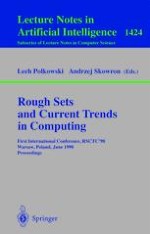1998 | OriginalPaper | Chapter
Fuzzy Similarity Relation as a Basis for Rough Approximations
Authors : Salvatore Greco, Benedetto Matarazzo, Roman Slowinski
Published in: Rough Sets and Current Trends in Computing
Publisher: Springer Berlin Heidelberg
Included in: Professional Book Archive
Activate our intelligent search to find suitable subject content or patents.
Select sections of text to find matching patents with Artificial Intelligence. powered by
Select sections of text to find additional relevant content using AI-assisted search. powered by
The rough sets theory proposed by Pawlak [8,9] was originally founded on the idea of approximating a given set by means of indiscernibility binary relation, which was assumed to be an equivalence relation (reflexive, symmetric and transitive). With respect to this basic idea, two main theoretical developments have been proposed: some extensions to a fuzzy context (e.g. Dubois and Prade, [1,2], Slowinski and Stefanowski, [13,14,15], Yao, [19]) and some extensions of the indiscernibility relation by means of more general binary relations (e.g. Nieminen, [7], Lin, [5], Marcus, [6], Polkowski, Skowron and Zytkow, [10], Skowron and Stepaniuk, [11], Slowinski, [12], Slowinski and Vanderpooten, [16,17,18], Yao and Wong, [20]). In the latter extensions, we wish to point out the proposal of Slowinski and Vanderpooten( [16,17,18]) who introduced and characterized a general definition of rough approximations using a similarity relation which is a reflexive binary relation, relaxing the assumption of symmetry and transitivity.
